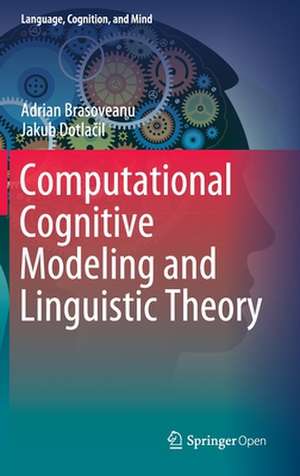Computational Cognitive Modeling and Linguistic Theory: Language, Cognition, and Mind, cartea 6
Autor Adrian Brasoveanu, Jakub Dotlačilen Limba Engleză Hardback – 15 mai 2020
The approach of this book is novel in more ways than one. Assuming the mental architecture and procedural modalities of Anderson’s ACT-R framework, it presents fine-grained computational models of human language processing tasks which make detailed quantitative predictions that can be checked against the results of self-paced reading and other psycho-linguistic experiments. All models are presented as computer programs that readers can run on their own computer and on inputs of their choice, thereby learning to design, program and run their own models. But even for readers who won't do all that, the book will show how such detailed, quantitatively predicting modeling of linguistic processes is possible. A methodological breakthrough and a must for anyone concerned about the future of linguistics! (Hans Kamp) This book constitutes a major step forward in linguistics and psycholinguistics. It constitutes a unique synthesis of several different research traditions: computational models of psycholinguistic processes, and formal models of semantics and discourse processing. The work also introduces a sophisticated python-based software environment for modeling linguistic processes. This book has the potential to revolutionize not only formal models of linguistics, but also models of language processing more generally. (Shravan Vasishth)
Preț: 534.36 lei
Preț vechi: 628.66 lei
-15% Nou
Puncte Express: 802
Preț estimativ în valută:
102.25€ • 106.76$ • 84.62£
102.25€ • 106.76$ • 84.62£
Carte tipărită la comandă
Livrare economică 04-18 aprilie
Preluare comenzi: 021 569.72.76
Specificații
ISBN-13: 9783030318444
ISBN-10: 3030318443
Pagini: 294
Ilustrații: XII, 294 p. 267 illus., 25 illus. in color.
Dimensiuni: 155 x 235 mm
Greutate: 0.61 kg
Ediția:1st ed. 2020
Editura: Springer International Publishing
Colecția Springer
Seria Language, Cognition, and Mind
Locul publicării:Cham, Switzerland
ISBN-10: 3030318443
Pagini: 294
Ilustrații: XII, 294 p. 267 illus., 25 illus. in color.
Dimensiuni: 155 x 235 mm
Greutate: 0.61 kg
Ediția:1st ed. 2020
Editura: Springer International Publishing
Colecția Springer
Seria Language, Cognition, and Mind
Locul publicării:Cham, Switzerland
Cuprins
Chapter 1. Introduction.- Chapter 2. The ACT-R cognitive architecture and its pyactr implementation.- Chapter 3. The basics of syntactic parsing in ACT-R.- Chapter 4. Syntax as a Cognitive Process: Left-corner parsing with visual & motor interfaces.- Chapter 5. Brief introduction to Bayesian methods and pymc3 for linguists.- Chapter 6. Modeling linguistic performance.- Chapter 7. Competence-performance models for lexical access and syntactic parsing.- Chapter 8. Semantics as a cognitive process I: Discourse Representation Structures in declarative memory.- Chapter 9. Semantics as a cognitive process II: Active search for cataphora antecedents and the semantics of conditionals.- Chapter 10. Future directions.
Textul de pe ultima copertă
This open access book introduces a general framework that allows natural language researchers to enhance existing competence theories with fully specified performance and processing components. Gradually developing increasingly complex and cognitively realistic competence-performance models, it provides running code for these models and shows how to fit them to real-time experimental data. This computational cognitive modeling approach opens up exciting new directions for research in formal semantics, and linguistics more generally, and offers new ways of (re)connecting semantics and the broader field of cognitive science.
The approach of this book is novel in more ways than one. Assuming the mental architecture and procedural modalities of Anderson’s ACT-R framework, it presents fine-grained computational models of human language processing tasks which make detailed quantitative predictions that can be checked against the results of self-paced reading and other psycho-linguisticexperiments. All models are presented as computer programs that readers can run on their own computer and on inputs of their choice, thereby learning to design, program and run their own models. But even for readers who won't do all that, the book will show how such detailed, quantitatively predicting modeling of linguistic processes is possible. A methodological breakthrough and a must for anyone concerned about the future of linguistics! (Hans Kamp) This book constitutes a major step forward in linguistics and psycholinguistics. It constitutes a unique synthesis of several different research traditions: computational models of psycholinguistic processes, and formal models of semantics and discourse processing. The work also introduces a sophisticated python-based software environment for modeling linguistic processes. This book has the potential to revolutionize not only formal models of linguistics, but also models of language processing more generally. (Shravan Vasishth)
The approach of this book is novel in more ways than one. Assuming the mental architecture and procedural modalities of Anderson’s ACT-R framework, it presents fine-grained computational models of human language processing tasks which make detailed quantitative predictions that can be checked against the results of self-paced reading and other psycho-linguisticexperiments. All models are presented as computer programs that readers can run on their own computer and on inputs of their choice, thereby learning to design, program and run their own models. But even for readers who won't do all that, the book will show how such detailed, quantitatively predicting modeling of linguistic processes is possible. A methodological breakthrough and a must for anyone concerned about the future of linguistics! (Hans Kamp) This book constitutes a major step forward in linguistics and psycholinguistics. It constitutes a unique synthesis of several different research traditions: computational models of psycholinguistic processes, and formal models of semantics and discourse processing. The work also introduces a sophisticated python-based software environment for modeling linguistic processes. This book has the potential to revolutionize not only formal models of linguistics, but also models of language processing more generally. (Shravan Vasishth)
Caracteristici
Presents an introduction to ACT-R for linguists and semanticists, with a focus on semantic phenomena in natural language Provides a novel incremental dynamic semantic system and detailed theory of semantic processing Discusses original experimental data relevant for our understanding of natural language meaning and how it is constructed in real time










